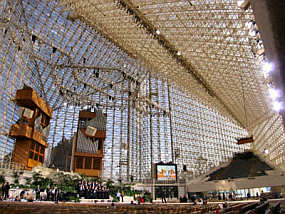These are the tales of several real churches I have known, either because of my own experiences as a member or through the experiences of friends. Each church shares the same peculiar reality.
Church A—A long-established congregation in a just-outside-the-city suburb, it flourished with the confluence of several pastoral streams that yielded a sum much greater than the parts. With vibrant leadership, plenty of wealthy families, a “somehow it just works” blend of worship styles, and a healthy mix of ages within the congregation, this church had it all. Conservative, Spirit-filled, evangelistic, and biblically solid, it was the place to be for about 15 years. Then, for no apparent reason, most of the leadership resigned in fits and starts over a two year period. The most influential laypeople left for a different church. Then came the inevitable church split. The neighborhood around the church changed, and both slid into a decline from which they have not recovered—and probably never will.
Church B—After the chaos subsided at Church A, it seemed many of its refugees ended up at this church, which was already being christened as the new place to be. Visionary leadership coupled with a hip vibe and a “this ain’t your grandpa’s church” feel combined to bless many and give the city something unique. Soon, this church garnered both local and national attention. But when its senior pastor fell ill, powerplays within the leadership played out in messy ways. The vision that had driven the church through 15 years of growth and influence waned when the church got caught up in Church Growth Movement shenanigans. A purge cleaned house of some of the powerplayers, and the church is making some inroads toward regaining its past vision. Sadly, it fell far enough that it has a long road ahead, though it is working hard to recover.
Church C—Once the area’s one true megachurch, this congregation was known throughout the city. For about 15 years, anything of importance to the Christian Church in the city had some input from this congregation. Besides the local kudos, the pastor and his staff were highly respected in the national denomination. I saw 2nd Chapter of Acts, Dallas Holm, John Michael Talbot, and others there during this church’s 15-year heyday. But a sex scandal in the children’s ministry tore the church apart. Now, I know no one who attends there.
Church D—This church thrived because of the large number of families with kids. All the youthful energy created a dynamic center of creativity and eagerness for Christ. Though a mainstream Protestant congregation, the pastors preached the Gospel and loved the people in the seats. Illness forced the senior pastor to step down. The kids in the church grew up and moved away, never to return. The congregation greyed and the neighborhood around the church grew poorer and more needy. Still, for about 15 years the church was a source of energy and Zoe-life.
Church E—Located in the city, this church was as diverse as they come. White, black, prostitute, lawyer, rich, poor—somehow they all got together to focus on Christ. The leadership team unswervingly upheld the Scriptures and ministered powerfully. For about 15 years, this church commanded the respect of many, with pastors from Churches B and C both claiming it as an inspiration for their own ministries. But the senior pastor grew older and funding for the church grew harder to come by. Folks who lived in the suburbs but drove to the city to attend dwindled. The top-notch music ministry fell on hard times when the pastor of music was let go due to budgetary constraints. I’m not sure what has happened to this church, but I know that people don’t mention it like they once did.
Anyone notice the one uniting factor of all these churches that have suffered decline and eclipse?
I call this Camelot Syndrome. For one brief shining moment these churches had everything going for them. Folks would walk in and feel the Spirit dwelling. They knew this was the place to be because people encountered God powerfully and had their lives changed.
And in each case, that moment of glory lasted for about 15 years.
Almost all of these church had been around for decades, but something happened in a 15-year span that took them from good to great. Equally, something bad eventually happened that tarnished Camelot. In these cases, the bad took on the following forms:
1. A loss of dynamic, visionary, Gospel-true leadership, either through resignations, age, political maneuvering, illness, compromise, or a combination of those elements
2. Demographic changes in the neighborhood surrounding the church
3. A failure of young people to return to the church after leaving to pursue a college education or better work opportunities outside the church’s geographic reach
4. A scandal or infighting that split the church
5. A failure to stem the loss of mature laypeople who comprised the backbone of the church
What troubles me is that I see few exceptions to Camelot Syndrome. Influential churches have about 15 years of glory before they run into a mass of issues that precipitate decline.  What’s even more distressing to me is that it’s not just influential churches who suffer; smaller congregations tend to face this same syndrome.
What’s even more distressing to me is that it’s not just influential churches who suffer; smaller congregations tend to face this same syndrome.
My question: Can this be prevented? (Crazier addendum: And should it be?)
Further, I would like to know if it’s possible to restore a church’s glory once tarnish taints Camelot. I see Church B striving to avoid becoming an also-ran, but the list of churches that have successfully fought against entropy and won seems to me to be vanishingly small.
I wonder also what must be done to avoid pinning too much of a church’s success to dynamic leadership. In almost every case, the influential leader(s) in my church examples handed the ministry to less-effective folks or to those who were unable to find their own footing before the lifeblood of their church had bled away to some other congregation.
Is the loss of the cream of the laypeople crop inevitable? How can churches keep their top laypeople during transitions, thus avoiding decline?
Lastly, how does a church keep its young people and retain its relevance in light of changing demographics within its surrounding neighborhood?
Your thoughts are welcome. Please leave a comment.

 And the birds of prey descended to snatch away his offering to God, threatening the blessing.
And the birds of prey descended to snatch away his offering to God, threatening the blessing. That tendency is also why the Lord Himself oversaw the destruction of the temple in 70 AD. He wanted the Church to get out there. To move. To not be tied to one place, to a building that can so easily become like cement shoes.
That tendency is also why the Lord Himself oversaw the destruction of the temple in 70 AD. He wanted the Church to get out there. To move. To not be tied to one place, to a building that can so easily become like cement shoes.